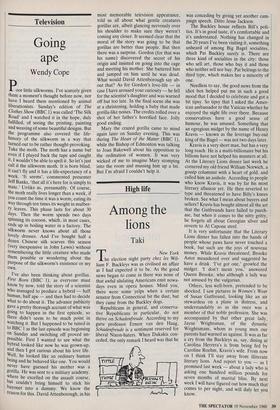Television
Going ape
Wendy Cope
Poor little silkworms. I've scarcely given them a moment's thought before now, nor have I heard them mentioned by animal liberationists. Sunday's edition of The Clothes Show (BBC 1) was called 'The Silk Road' and I watched it in the hope, duly fulfilled, of seeing the printing, painting and weaving of some beautiful designs. But the programme also covered the life- history of the silkworm in a way that turned out to be rather thought-provoking. Take the moth. The moth has a name but even if I played back the tape and caught it, I wouldn't be able to spell it. So let's just call it the silkworm moth. It is born blind, it can't fly and it has a life-expectancy of a week. 'It seems', commented presenter Jeff Banks, 'that all it's here for is simply to mate.' Unlike us, presumably. Of course, the moth really lives longer than a week, if you count the time it was a worm, eating its way through ten times its weight in mulber- ry leaves. This phase lasts for about 30 days. Then the worm spends two days spinning its cocoon, which, in most cases, ends up in boiling water in a factory. The silkworm never knows about all those lovely dresses. And I've bought half a dozen Chinese silk scarves this season (very inexpensive in John Lewis) without remembering the little creature who made them possible or wondering about the Purpose of the silkworm's existence or my own.
I've also been thinking about gorillas. First Born (BBC 1), as everyone must know by now, told the story of a scientist who managed to produce a hybrid — half human, half ape — and then had to decide what to do about it. The advance publicity gave a pretty thorough account of what was going to happen in the first episode, so there didn't seem to be much point in watching it. But I happened to be tuned in to BBC 1 as the last episode was beginning on Sunday and switching off proved im- possible. First I wanted to see what the hybrid looked like now he was grown-up, and then I got curious about his love life. Well, he looked like an ordinary human being and he behaved like one. You would never have guessed his mother was a gorilla. He was sent to a military academy, where he excelled on the assault course, but couldn't bring himself to stick his bayonet into a dummy. We know the reason for this. David Attenborough, in his
most memorable television appearance, told us all about what gentle creatures gorillas are, albeit glancing nervously over his shoulder to make sure they weren't coming any closer. It seemed clear that the moral of the story was going to be that gorillas are better than people. But then there was a surprise. Gordon (for that was his name) discovered the secret of his origin and insisted on going into the cage and meeting his mother. She battered him and jumped on him until he was dead. What would David Attenborough say ab- out that? As for Gordon's love-life — in case I have aroused your curiosity — he fell for the scientist's daughter and was warned off but too late. In the final scene she was at a christening, holding a baby that made gorilla-like noises. The credits rolled over a shot of her father's horrified face. Jolly good ending.
Mary the crazed gorilla came to mind again later on Sunday evening. This was during The Heart of the Matter (BBC 1), while the Bishop of Edmonton was talking to Joan Bakewell about his opposition to the ordination of women. It was very wicked of me to imagine Mary stomping into the room and mussing him up a bit. But I'm afraid I couldn't help it.






















































 Previous page
Previous page